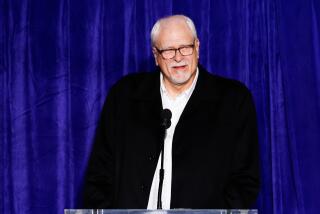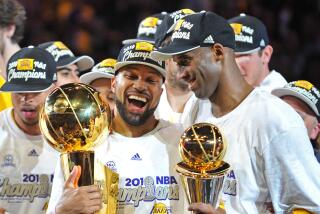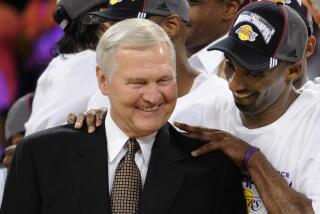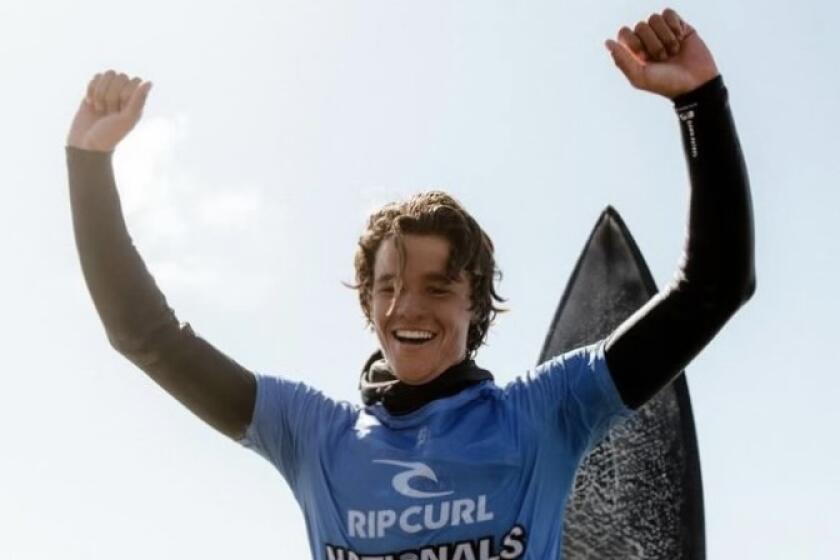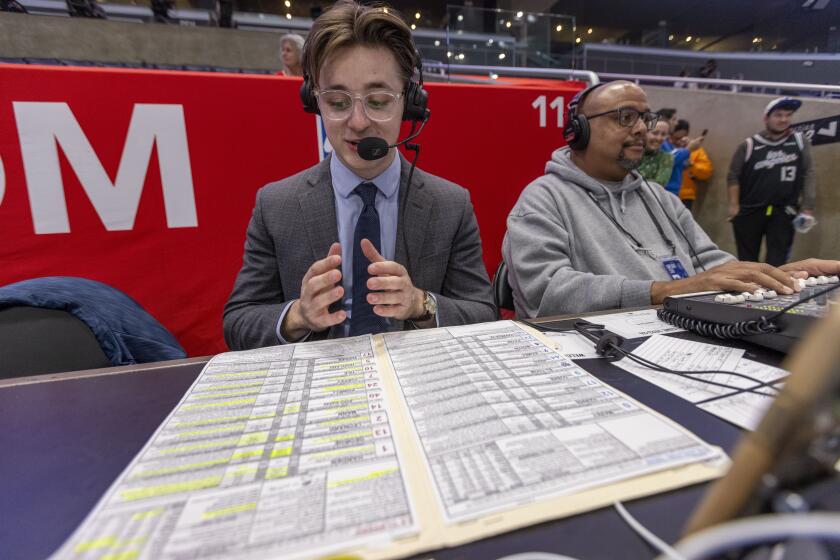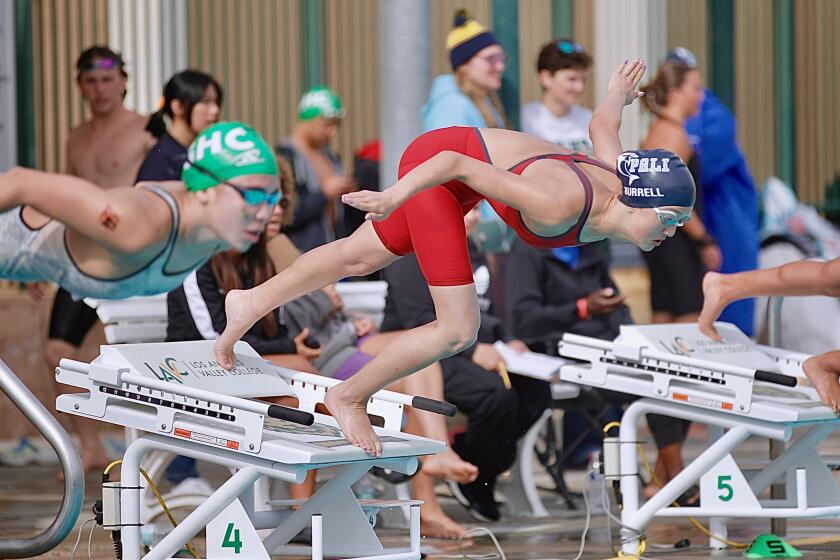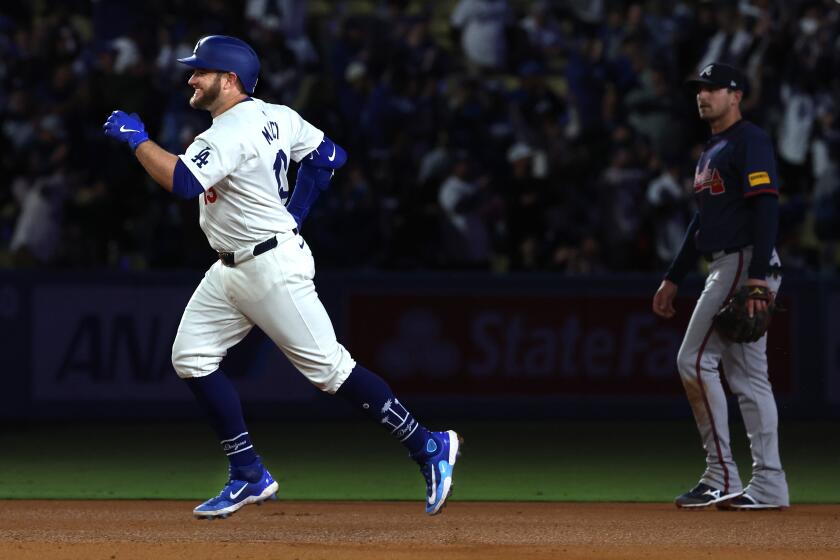Metta World Peace still grateful for his shining moment with the Lakers

L.A. Times Today airs Monday through Friday at 7 p.m. and 10 p.m. on Spectrum News 1.
Metta World Peace smiles as he stands across the street from Staples Center and looks at the arena that served as the stage for the biggest moment of his career.
Nine years ago next month Kobe Bryant passed the ball to World Peace, then Ron Artest, and he hit a three-pointer with less than a minute left in Game 7 of the 2010 NBA Finals against the Boston Celtics to essentially seal the Lakers’ 16th and most recent championship.
“I love that moment,” he said. “I look at it sometimes on YouTube. It’s the biggest shot of my career. What are you going to do? I’m grateful for that moment and the fact that Kobe shared that moment with me. That was supposed to be his moment and he shared it with me.”
World Peace is confident he would have been satisfied if he had not hit that shot and won that championship but acknowledges that both helped validate a roller coaster 18-year career in the NBA.
“I always knew I was a champion, maybe I wasn’t a champion morally, but I knew I was one of the best,” World Peace said. “You still need to go get that hardware though. I needed that hardware bad. And you know what? I would have done what [Kevin] Durant did and what [DeMarcus] Cousins is doing. No question. I had to come to the Lakers to win a championship. I was going to get me a … ring.”
World Peace is sitting at a restaurant near Staples Center reminiscing about his career in between bites of calamari and tuna tartare. He’s in a reflective mood on the eve of the premiere of his documentary, “Quiet Storm: The Ron Artest Story,” which was produced by Bleacher Report and will appear on Showtime on Friday. The film chronicles his upbringing in the Queensbridge projects and getting a part-time job at Circuit City while he was a rookie with the Chicago Bulls (“I thought it would be a feel-good story, the Bulls didn’t so I quit after a day”) to his strained relationship with former teammates on the Indiana Pacers (“It still doesn’t feel right that I have a ring and they don’t”) and raising awareness about mental health.
The “Malice at the Palace,” the 2004 brawl that spilled into the stands and cost World Peace 86 regular-season and playoff games, plays a significant role in the film. “If that night doesn’t happen I’d have had two ESPN commercials, a TNT commercial, a Carl’s Jr. commercial, a multi-million-dollar LA Gear campaign and a R&B album coming out with a full marketing budget,” World Peace said. “I was one of the best players in the league on one of the best teams in the league, and that brawl took away all that.”
John Green, the fan who helped bring the brawl into the stands by hitting World Peace with a cup of diet soda, was interviewed throughout the film. It wasn’t hard to track him down. He has been friends with World Peace for the past decade.
“I asked Twitter to help me find him and someone sent me his number,” World Peace said. “I called him and he couldn’t believe it was me and we just talked. I wanted to travel with him and do speaking tours in different communities where people have differences. That was the plan, but we had no one to help execute the plan so it didn’t happen but it might still happen. We talked the other day about it.”
Dr. Santhi Periasamy, who was World Peace’s therapist during that time, not only helped him let go of old feuds but played an integral role in the biggest shot of his career. She was the psychiatrist World Peace famously thanked on the court after winning the championship.
“I was doing my sessions over text message and over the phone and I was listening to soothing Alberta Hunter songs on repeat during the entire playoffs,” World Peace said. “My breathing was intact but I didn’t feel right before Game 7. I just felt like I was going to get into it with Paul [Pierce] and get ejected. I could not afford to lose it, so I asked her to come down and come see me and she helped me relax and have the best game of my career.”
The game would serve as the high-water mark of World Peace’s career and the last significant moment in Lakers history. The team has not made it out of the second round since that game, hasn’t won a playoff game in seven years and hasn’t made the playoffs for six straight seasons. Although World Peace retired in 2017, he takes some of the blame for ushering in this current era as he works with the Lakers on their mental health initiative and player support.
“I was on those teams that got swept by the Mavericks and Spurs and missed the playoffs my last two years,” World Peace said. “I feel bad but I know Jeanie [Buss] is going to turn it around. She helped get LeBron James and they’re going to bring in another star. They would have finished fourth in the West this year if they were healthy and they’ll finish second or third next year. Everyone needs to calm down. They’re going to be fine. We need to give Jeanie a chance. I got three chances. Everyone deserves a chance.”
While he remains optimistic about the team’s future, he’s grateful he was able to win a championship with the Lakers and find himself in the process.
“I’m grateful that I came here when I did and ended my career here,” he said. “The fans have treated me so good. I know it’s partly because I won, but I’m so grateful to be a Laker and for the Lakers fans and for L.A. They helped me when my life was spiraling out of control. This will always be my home.”
More to Read
Get our high school sports newsletter
Prep Rally is devoted to the SoCal high school sports experience, bringing you scores, stories and a behind-the-scenes look at what makes prep sports so popular.
You may occasionally receive promotional content from the Los Angeles Times.
